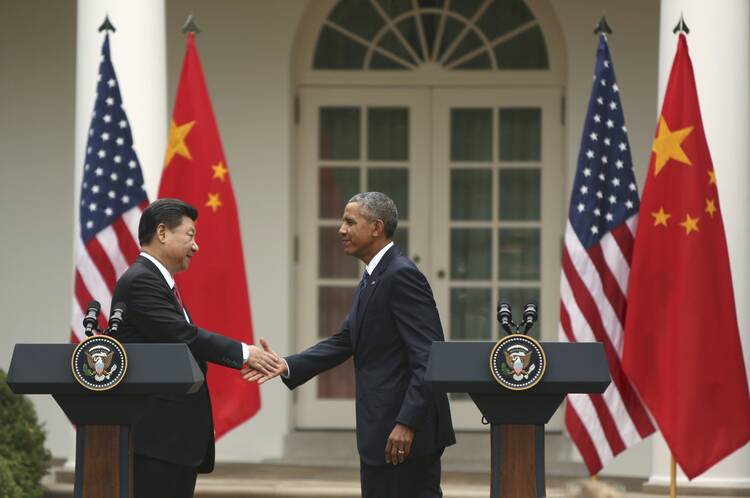President Obama and President Xi Jinping of China owe Pope Francis a debt of gratitude. With Mr. Xi’s and the pontiff’s U.S. visits overlapping, the pope was expected to be the geopolitical undercard for what is likely to be the last Sino-American summit of the Obama presidency. Instead, the pope stole the show and kept the spotlight off the visiting Chinese leader—allowing the two presidents to get some real work done.
Both presidents went into the late September meeting in awkward positions, domestically and in their countries’ relations with each other. But Mr. Obama was still basking in the success of re-establishing diplomatic relations with Cuba. The U.S. economy continues to improve, and Mr. Obama seems emboldened to continue working on issues where he knows he can effect change without Congressional approval.
Mr. Xi had just hosted a huge parade of military hardware in early September, including missiles designed to neutralize American aircraft carriers, in yet another move designed to solidify his place as China’s strongest leader since Deng Xiaoping.
Mr. Xi’s campaign against corruption, considered by both domestic and foreign observers to be a purge as much as a clean-up, continues, having most recently ensnared the head of China’s largest oil refining company. But Mr. Xi’s visit came as his leadership of China’s economy is increasingly being questioned. A Chinese stock market tumble in August gave investors the jitters. His predecessor, Hu Jintao, was seen as a lackluster statesman, but China’s growth curve continued upward, which was good enough for most of the 1.4 billion people Hu’s leadership affected.
China’s Communist Party hitched its train to the engine of economic growth more than three decades ago, and it views social stability as its number one priority at all times. How it maintains that control during the country’s first major economic slowdown in more than a generation will determine Mr. Xi’s ultimate success.
That economic uncertainty put China on the back foot for the first time in years. In the past the United States needed China to buy more U.S. goods—even American debt. Now it is China that is facing a slowdown and could benefit from a better trade relationship with the United States.
But geopolitics threaten to stand in the way. Mr. Xi is adamant about enforcing China’s territorial claims, and the building of three airstrips on disputed atolls and islands in the South China Sea is a direct thumb in the eye to the Obama administration. At a time when the two countries could and should have better relations, China’s Great Wall of Sand remains a significant barrier, though it did not prevent meaningful action during the summit.
The two sides agreed to work together on cybercrimes, which the United States accuses China of committing against it. Perhaps most important was an agreement to work more closely on climate change.
They agreed to do more to restrict wildlife trafficking, especially in elephant ivory, for which China has re-emerged as a major market. Mr. Xi also met with U.S. technology leaders, most awkwardly with Mark Zuckerberg, the founder and chief executive officer of Facebook, to which access is blocked in China.
Progress on any issue should be viewed as a victory, especially by the Obama administration. With just over a year left in his term, China is already looking to whoever will come next, knowing it could be dealing with Hillary Clinton, a former secretary of state, who gave a strident women’s rights speech in Beijing just 20 years ago; Joseph Biden, if he chooses to run; or perhaps even Donald Trump.
That is because Mr. Xi, who will almost certainly remain in the big chair until 2023, will outlast even a two-term successor to President Obama. As such, he had no particular need to offer Mr. Obama any long-term concession at what may have been their last official meeting.
One issue received only a little play during the two countries’ discussions: religious freedom. “Even as we recognize Tibet is part of the People’s Republic of China, we continue to encourage Chinese authorities to preserve the religious and cultural identity of the Tibetan people, and to engage the Dalai Lama and his representatives,” Mr. Obama said. It was a standard statement that will likely receive the standard response.








